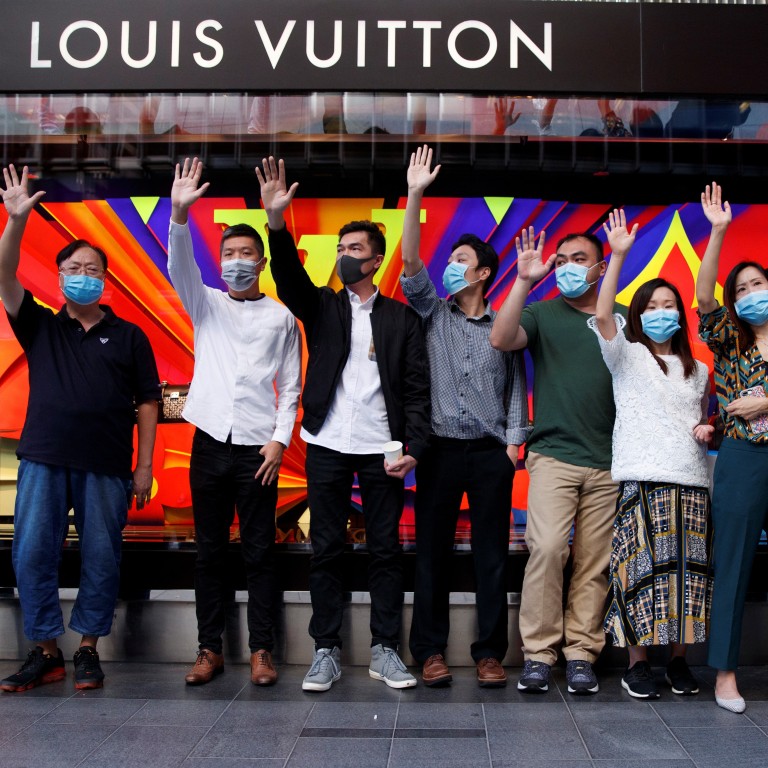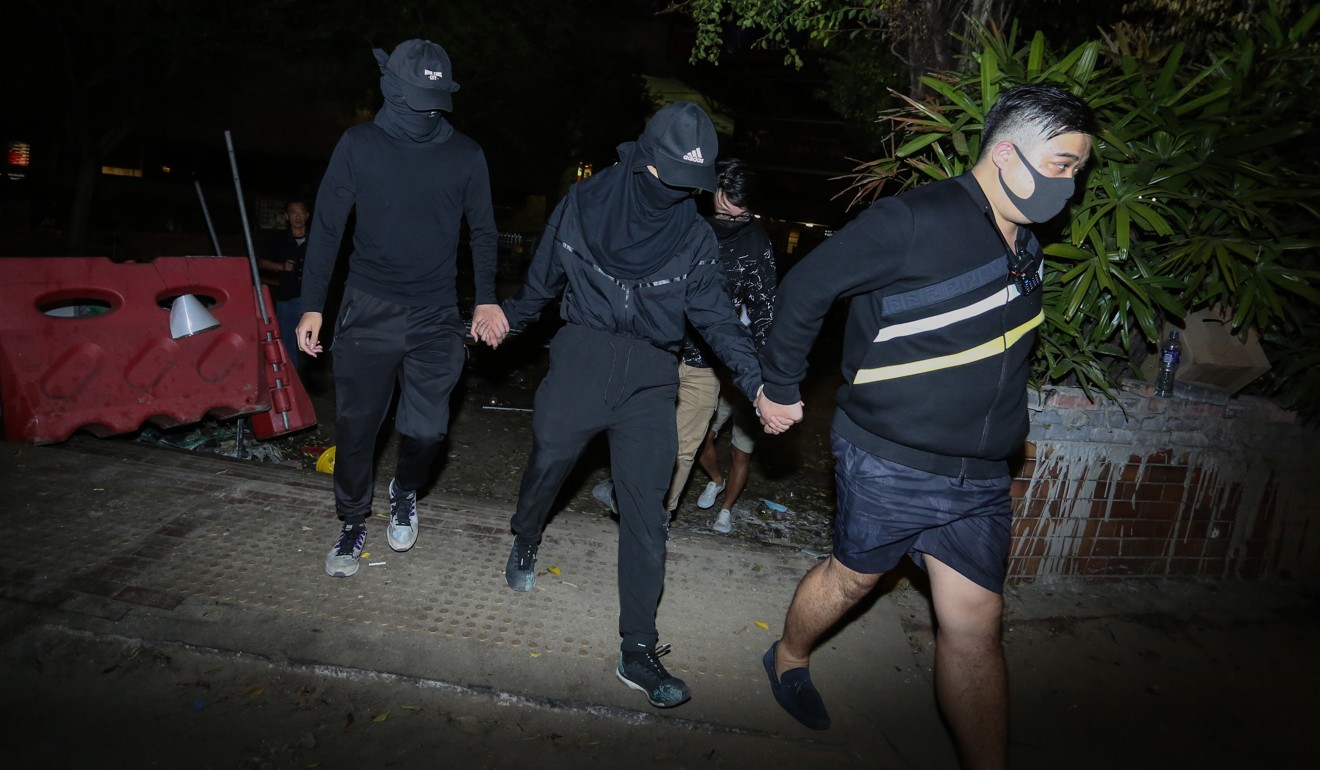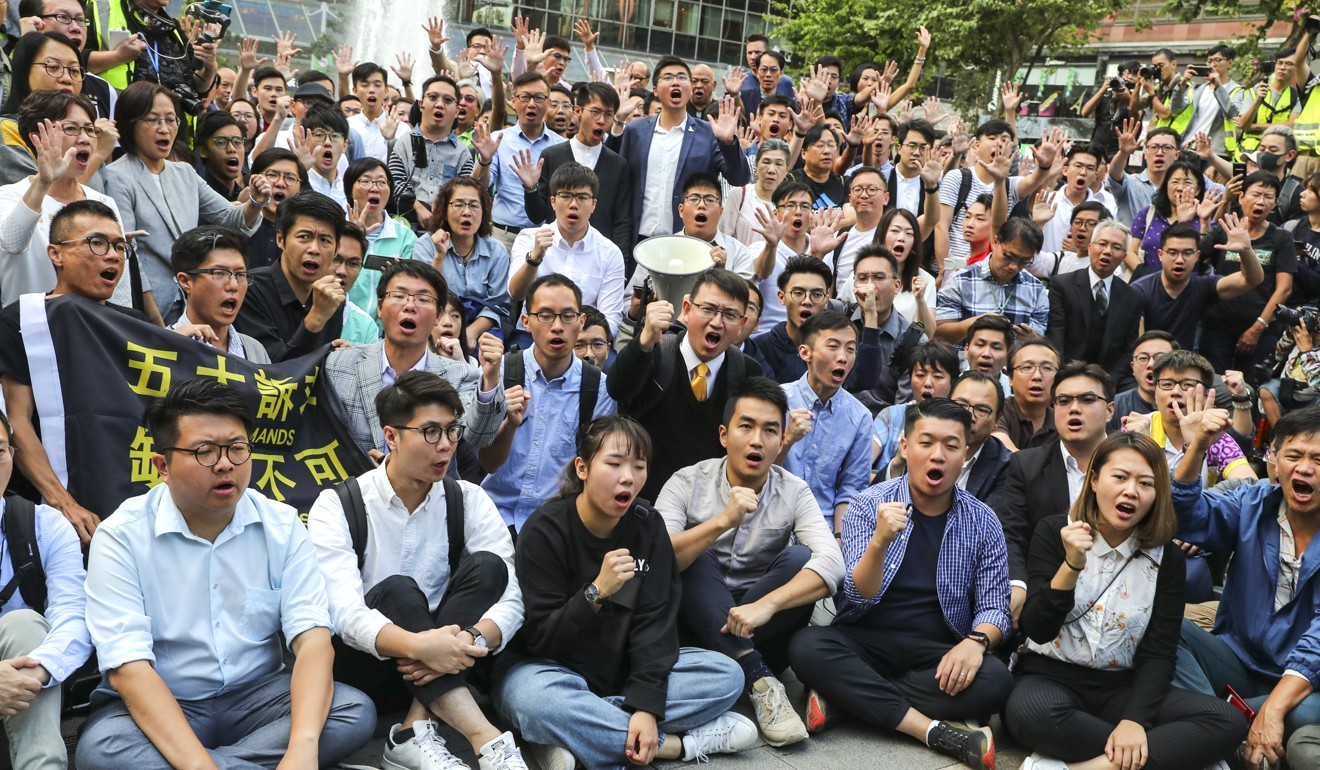
Hong Kong protests: police to send negotiators and psychologists to PolyU to convince holdouts to come out
- Police promise protesters will not be arrested on the spot and will be treated similar to minors
- Earlier in the day, university released three statements urging government to arrange for immediate departure of ‘dozens’ as campus is in ‘utter chaos’
Police will enter Polytechnic University for the first time since cordoning off the campus on November 17 after violent clashes with masked radicals, as part of a team to persuade the last protesters remaining inside to leave.
There will be no arrests on the spot, and those who need medical treatment will receive it.
The concession was made late on Monday, after PolyU top brass appealed for an end to the police blockade, amid growing concern about the health and mental well-being of those holding out there.
Chief Superintendent Ho Yun-sing, district commander of Yau Tsim District, said: “We will go to Polytechnic University to persuade those who are still inside the campus to leave as soon as possible.”
He said the force had assembled a team comprising school principals, scholars, former members of the Independent Police Complaints Council, social workers, clinical psychologists, members of suicide prevention groups, ambulance and fire services personnel, and police negotiators.
“The members of the force will go to the campus to negotiate and not to arrest. Do not misunderstand us,” he said.
Ho also said police would give priority to protesters who required medical assistance, as many were reported to have shown signs of mental problems.
Though no arrests would be made on the spot, Ho said the protesters would be photographed and their personal information would be recorded, in much the same way police dealt with protesters who were under 18 and left the campus since last week.
Ho did not rule out arresting them later, but said each case would be assessed individually, based on available evidence.

“We are very concerned about the situation at PolyU. We are worried about their mental, physical and emotional health,” he said, urging the protesters to leave “peacefully”.
The police siege of PolyU came after anti-government protests, now in their sixth month, moved from the streets onto campuses, with the Chinese University in Sha Tin and PolyU the worst affected.
PolyU was occupied by more than 1,000 masked radicals and their supporters about two weeks ago and was the scene of intense, violent clashes on November 17.
Duo trapped in PolyU slam police for ‘depriving them of right to vote’
The entrance to the campus appeared like a war zone that Sunday, with the mob throwing a large number of petrol bombs and shooting arrows at police. An armoured vehicle was set ablaze, footbridges were set on fire, and an officer had his calf pierced by an arrow.
Police responded with tear gas and water cannon, blocked all exits of the campus, and ordered everyone inside to leave. Police said that those older than 18 would be arrested on the suspicion of rioting, but that minors would have their particulars recorded before being let go.

Since then, more than 1,100 have surrendered, had their details recorded, or were caught and arrested. The total included about 300 minors. PolyU said on Monday that only 50 were its students.
Many emerged only after school principals, religious leaders, social workers and others went into the campus and persuaded them to come out. Several others escaped.
Earlier on Monday, PolyU top brass released three statements urging the government to arrange for the immediate departure of “dozens” of individuals still hiding there.
“In light of the tense situation, we have contacted police again and urged them to let the remainders on the campus leave after having their identities registered,” the last statement said.

The statements were signed by university chairman Lam Tai-fai, president Teng Jin-guang and other senior officials, and came a day after two protesters inside the campus claimed that those holding out were in a poor state emotionally and mentally, with some refusing to eat.
Are Hong Kong’s universities becoming ‘weapons factories’?
In its first statement, the university said: “The campus is in utter chaos at present, laden with damaged objects, petrol bombs and hazardous items, which pose a great threat to personal safety.”
It said hygiene and air quality had deteriorated to such a point on the campus that the health of not only those holding out, but also the social workers and medical officers helping them was under threat.
Some of those who have been into the campus to look for protesters estimated that about 30 were still there.
Pastors Theresa Chan Kam-mei and Chan Young-man, who have been helping to search for holdouts, said they had decided to pull out because they could no longer find anyone except two who met a team of legislators, a lawyer and a social worker on Monday night.
But they remained ready to respond if any protesters called them.
Theresa Chan was concerned to hear of the plan for police to enter the campus, saying: “The world ‘police’ has been the biggest put-off when we urge people to leave.”
More than 8,000 petrol bombs ‘found in weapons factory at Chinese University’
Accounts given to the Post over the past week included some protesters saying they would hold out to the very end, while others said they feared arrest and mistreatment by police.
On Monday, the Hospital Authority and Fire Services Department dispatched a team of a doctor, a nurse, two clinical psychologists, a patient assistant, and paramedics to the university.

Pro-democracy legislators Gary Fan Kwok-wai, Roy Kwong Chun-yu and Ip Kin-yuen formed a team with lawyer Daniel Wong Kwok-tung and other social workers to speak to two protesters who said they had been on the campus for nine straight days.
Outside the university, a group of newly elected district councillors from the pan-democratic camp staged a rally, as hundreds of people stood on Science Museum Road to stage a roadblock. A few black-clad people yelled “police are murderers” at riot police who stood guard on the path that led to the university.
Many said they came to support the protesters still trapped at PolyU, while demanding police to stop besieging the campus.
“I want to tell the protesters inside, ‘we haven’t given up on them, we will not let this go on’,” Eric Mo, a 23-year-old student, said.
Champagne protest in Central
At lunchtime on Monday, hundreds of people showed up at Hong Kong’s financial district in support of the two frontline radicals who are still at PolyU and are refusing to surrender.
Dressed in office attire, they gathered on Pedder Street in Central at about 12.45 and chanted slogans supporting the pair.
Riot police arrived at around 1pm and urged them not to occupy the roads. Pro-establishment lawmaker Regina Ip Lau Suk-yee was escorted by riot police officers as protesters heckled her when she tried to pass through the crowd. It was not clear why she was there.
The protesters also called on United States President Donald Trump to sign into law the Hong Kong Human Rights and Democracy Act, which would put Chinese and Hong Kong officials who violate human rights in the city at risk of sanctions.
Some protesters handed out cups of champagne to passers-by to celebrate Sunday’s landslide victory of pro-democracy candidates in the district council elections.
They also called for the government to heed the protest movement’s demands, including an inquiry into alleged police brutality, amnesty for those arrested and universal suffrage.
The protesters also marched on the pedestrian lanes of Chater Road and Des Voeux Road before dispersing soon after 2pm.
Other gatherings were expected to take place at the South Road Rest Garden in Hung Hom, Salisbury Garden in Tsim Sha Tsui and Public Square Street Rest Garden in Yau Ma Tei.
Additional reporting by Albert Han and Kathleen Magramo


